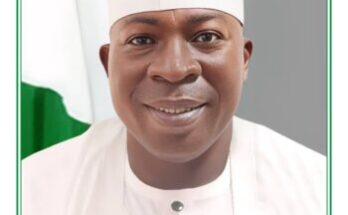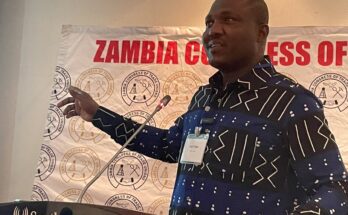In every government, the provision of social amenities, such as health, education and water, is the cardinal agenda in transforming the livelihood of its citizens. In this interview, General Manager, Yobe State Community and Social Development Programme, Goni Baba Gana, speaks on the progress recorded by the APC-led government in the state in the various communities.
Sir, can you give us the background of CSDP? Th ank you for that question. But fi rst of all I will like to thank God and our able leader in the state, the executive governor of Yobe State, Alhaji Ibrahim Gaidam for the regular supports he has been rendering to this agency in form of paying government contributions, advices and otherwise.
Without him, our people would not have benefi ted from this programme. To your question, CSDP is an acronym for Community and Social Development Programme. It is a project on poverty reduction in Yobe State which started as a pilot project with a name Community Based Reduction Project (CBRP) for quite a number of years from 2002-2009.
After the success of that project and its expiration, it was renewed and renamed CSDP with same objectives of providing basic, social and infrastructural facilities to communities in Yobe, and has been operating since April 2009-December2013. An additional fi nance of one and two, of $4million and $7million respectively, were prepared mainly for the victims of Boko Haram insurgency which claimed millions of lives in the north-east, making a total of $11m from the World Bank to implement projects across state. It is a state/federal government’s project in collaboration with World Bank and it is operational in27 states of the federation and FCT, Abuja. What are the aims and objectives behind establishing this organization? Is to reduce hardship or poverty among the rural communities, that is to have access to social infrastructures as well as proper use of economic resources in the rural areas. It is also aimed at rehabilitating those seriously aff ected by the insurgency which includes vulnerable group, gender and the Internally Displaced Persons IDPs. What type of projects do you assist in funding and who are your donor agencies? We provide the rural dwellers with access to potable water, health and educational facilities, rural roads, culverts, drainages and other various infrastructural activities and the projects are being funded by World Bank, under International Development Association IDA, with the state paying some government contributions. How cordial is the relationship between Gana Interview In every government, the provision of social amenities, such as health, education and water, is the cardinal agenda in transforming the livelihood of its citizens. In this interview, General Manager, Yobe State Community and Social Development Programme, Goni Baba Gana, speaks on the progress recorded by the APC-led government in the state in the various communities. Th e encouragement we are giving is that; the agency is there for them, let them organize themselves we are keenly waiting for them to come so that the infrastructures are provided to them, especially those aff ected by the insurgency. the Yobe state government and the donor agencies, and do you have funding challenge? Th e relationship is cordial because it was the state government that requested for such interventions and was approved. In fact, the cordial relationship is what is sustaining the project since 2002-date. Th e state has concern of providing dividends of democracy to the entire people of the state, so every nook and cranny of the state benefi ts from the programme. Th e government is working tirelessly towards the returning IDPs to see that they peacefully return to their communities with basic social amenities and issues related to housing also being provided. Recently, the Yobe state government allocated lands to IDPs who have decided to permanently dwell at Kukareta community in Damaturu, we will sensitize them so that they can also benefi t from our programme. So in summary, the state went into an agreement with them and the relationship is cordial there is no problem at all, Governor Ibrahim Gaidam has always been trying seriously. What are the criteria needed by a group before applying for project sponsorship? Well, the criteria needed are, we have what we call poverty ranking of the state. We gather data on the infrastructural defi cit of all the communities across the state and the local governments are ranked on the basis of their own defi ciency in terms of infrastructural facilities. We sensitize them to form a group so that they can register and at the same time identify their needs. Also, now that we are dealing with gender and vulnerable groups, we consider communities that are mostly aff ected and we sensitize them, identify this kind of facilities then we assist them to be able to implement those projects. It is a demand-driven project. After the due sensitization, it is the community that will come and voice out their demand in which we will facilitate and ensure that the community implements the project by themselves. Our position here is facilitation to ensure that there sources given are being utilized and properly used in executing the project. Do you have any challenge with the communities, government or your donor agencies? It is a new project and you are to give it to the community resources to handle by themselves, the procedure they have been using before was top-bottom approach but now is a demand driven approach, means they will be given the responsibility to execute the project themselves. So, the challenge here is, you have to build their capacity fi rst, by being very vigilant on supervision to ensure they carry out the project successfully and you have to train the m and ensure that what they learnt are utilized. Th e agency becomes part and parcel of the project by making sure they are doing the right thing. Like how many projects have you so far sponsored since inception? Well, when you say since inception, I will give you the one we started at the piloting period. During that period, we implemented about 838 projects between 2002-2009, and under the current dispensation of CSDP, we have implemented 330 projects, while for the additional funding one and two, we have 36 projects and for small and micro projects they are 73 projects currently ongoing. How do you monitor the projects to ensure that they are up to your standards? First is the identifi cation, the design and the need of the community. We also make sure that the project the community is engaging herself can be maintained by them. We have many structures of monitoring to ensure the implementations, which include the structure at the agency level by our qualifi ed staff in those fi elds, at the community level we normally form a fi ve sub-committees made up of four members each. One of the most important committees is the operation and maintenance committee, which is charged with the responsibility of making sure that the project is implemented according to the designed specifi cations and also properly executed in conformity with the earlier submissions. Also, at the local government where the project is located, we have a desk offi ce that also monitors all the activities there. Individuals and Civil Society Organizations (CSOs) who are interested in providing services can also monitor the implementation. We provide them with 90% o fthe total project cost while the community provides 10% which is to be paid in kind, cash or materials and the money is being released in stages base on the progress of work for GVP which includes IDPs the contributions of 5% money in labour, kind and materials. Do you work across some few local governments in the state or all? What has been their response? During the piloting period, we were handling all the 17 local government areas of the state up to the time of the CSDP, but with the current happenings of the insurgency, we are focusing on our poverty map to ensure that the most aff ected persons are considered fi rst. For example, Gulani and Gujba local governments that were once overrun by Boko Haram, houses burnt down, people killed, others displaced; in fact they lost everything, looking at their situation; they are now our main target, so any community we select we have a concrete reason for the selection, we have poverty map of the state ranking all the local governments. Finally, do you have any call to make especially to those who haven’t ever heard of your organization? Th e residents are aware of the operations of the CSDP. You can only sensitize the people because it is a demand-driven, you cannot just go and start any project because you will execute a project that does not have ownership and it will not last. Th e encouragement we are giving is that; the agency is there for them, let them organize themselves we are keenly waiting for them to come so that the infrastructures are provided to them, especially those aff ected by the insurgency. As a result of the insurgency, a lot of vulnerability were created, children without parents, widows and people who were injured. Let them get in touch with us, we will sensitize them and make sure they too benefi t from these facilities.



